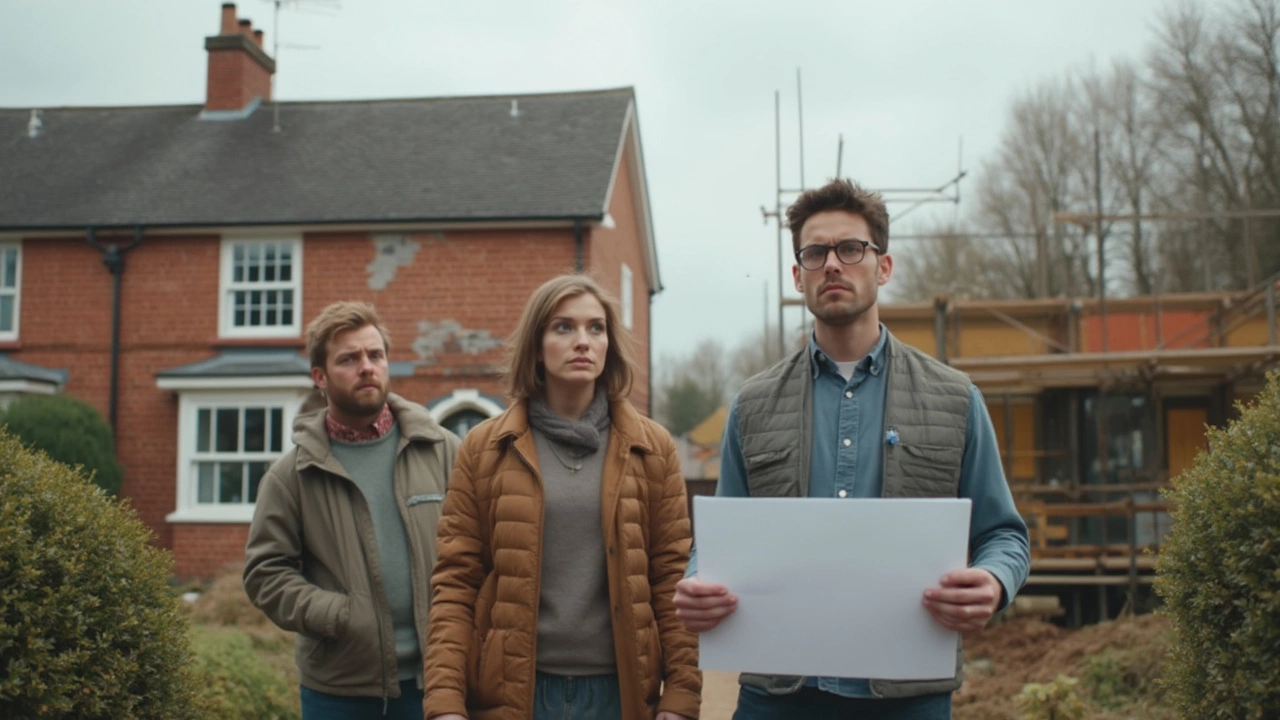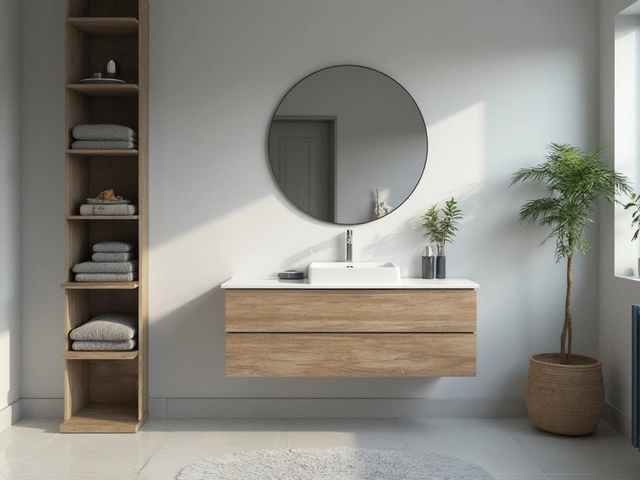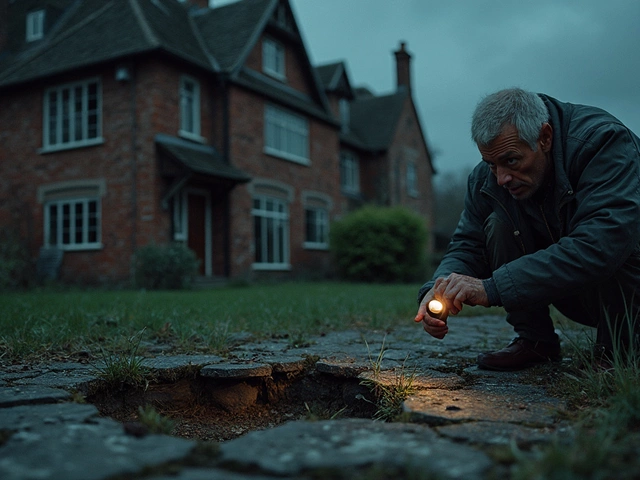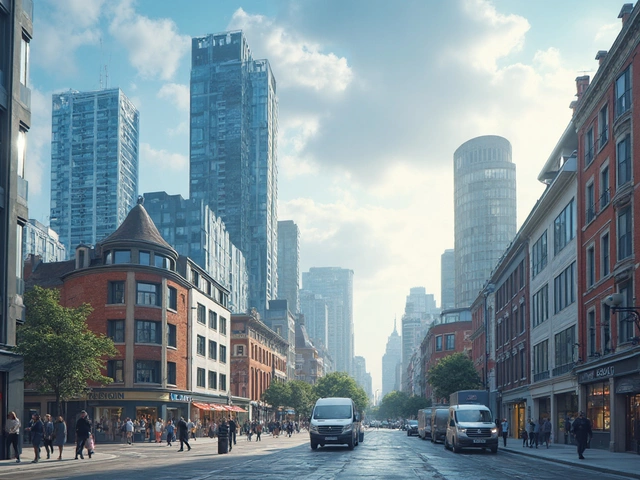Thinking about whether to buy a house or roll up your sleeves and build one from scratch? The simple truth is, both seem easier on paper than they actually are. Even if you’ve been scrolling Zillow for months, you’ll hit hidden costs and forgotten hassles no matter which route you take.
If you buy, you get instant access—no waiting months for floor joists or drywall. But the catch? You might be stuck paying extra to fix someone else’s taste in kitchens, or even fighting over a house with three other families in this wild market.
Building gives you control, sure, but it’s not all sunshine and Pinterest boards. Material prices can skyrocket halfway through your build, or your contractor might ghost you for weeks. Towns love to bury you in paperwork before you even get to break ground. Knowing what you’re really signing up for, and what kind of mess or magic comes with your decision, is half the battle.
- Hidden Costs of Buying vs Building
- Customization & Control: Who Wins?
- Timeline Surprises and Delays
- Dealing with Stress and Headaches
- Real-Life Tips for Making the Call
Hidden Costs of Buying vs Building
It’s wild how fast sneaky expenses pile up, whether you’re buying a house or jumping into building a house. Don’t let the sticker price trick you—there’s usually a lot hiding behind that number.
First, let’s talk buying. Most folks only budget for down payment and moving trucks, but here’s what really adds up:
- Inspection fixes: That sweet house you found might have a leaky roof or old wiring. Repairs can run into the thousands before you even move in.
- Closing costs: These include lender fees, title insurance, and taxes. They usually eat up another 2-5% of the price tag.
- HOA fees and surprise assessments: Even if they sound small upfront, they sneak up. One year, an HOA in Arizona hit owners with a surprise $1,600 bill to repave the roads.
- Remodeling and upgrades: You might need to knock down a wall or redo a bathroom. Average kitchen remodels in the US now run over $25,000.
Now, what about building a house? Sure, you skip the old house quirks, but new build expenses add up just as fast:
- Land cost and prep: Raw land almost always needs clearing, grading, and maybe a driveway before you can lay a foundation. These jobs often go past $10,000 even in cheaper areas.
- Permit fees: Small towns might charge a few hundred bucks, but spots near big cities can go over $10,000 in permits for a new build.
- Inflation and delays: Lumber was up 300% for a minute back in 2021. If you hit a slow stretch, prices for supplies can skyrocket before your walls even go up.
- Upgrades and changes: Once the build starts, it’s tempting to add recessed lights or fancier tile. Change orders cost real money—builders sometimes tack on a 10-20% fee for every change during construction.
- Utilities tie-in: Connecting to water, electric, and sewer can be a mini-project on its own. Rural lots sometimes run $5,000 just to tie in power, not counting wells or septic.
Check this out for a quick side-by-side compared to the initial budget:
| Type | Average Initial Price | Average Hidden Costs |
|---|---|---|
| Buy Existing | $400,000 | $20,000 - $50,000 |
| Build New | $500,000 | $50,000 - $100,000 |
No matter which route, getting blindsided by these costs is pretty common. Always add 10-20% padding on top of what you think you’ll spend—your future self will thank you.
Customization & Control: Who Wins?
If customizing every corner of your home is high on your wishlist, building a house pulls way ahead of buying. When you build, you’re calling the shots on everything: layout, finishes, even the number of sockets in your kitchen. You’re not stuck with the last owner's choices like weird carpet colors or a bathroom stuck in the '90s.
But the flip side? All those decisions can get overwhelming and expensive. Companies that handle new builds often use set floor plans to keep costs predictable. The more you want to switch things up—a bigger shower here, wider windows there—the more you tack onto the bill. One 2024 study from the National Association of Home Builders found that custom features can add 15-30% to your total build cost, compared to sticking with the basic plan.
Here’s a quick breakdown on who controls what in each scenario:
| Feature | Buying | Building |
|---|---|---|
| Floor Plan | Take it or leave it | Mostly up to you |
| Finishes | Pre-picked | You choose (and pay for) |
| Smart Tech | Rare, or needs retrofitting | Easy to add from day one |
| Landscaping | What you see is what you get | Blank slate (but your problem) |
When it comes to control, building a house makes life easier for picky homeowners. If you dream about outlets exactly where you need them or hate standard builder-grade finishes, building is the clear winner. But don’t discount the mental load. Decision fatigue hits hard, and small custom choices snowball fast into real money and delays. If flexibility isn't a must, buying pre-owned lets you move in fast and maybe save some sanity.
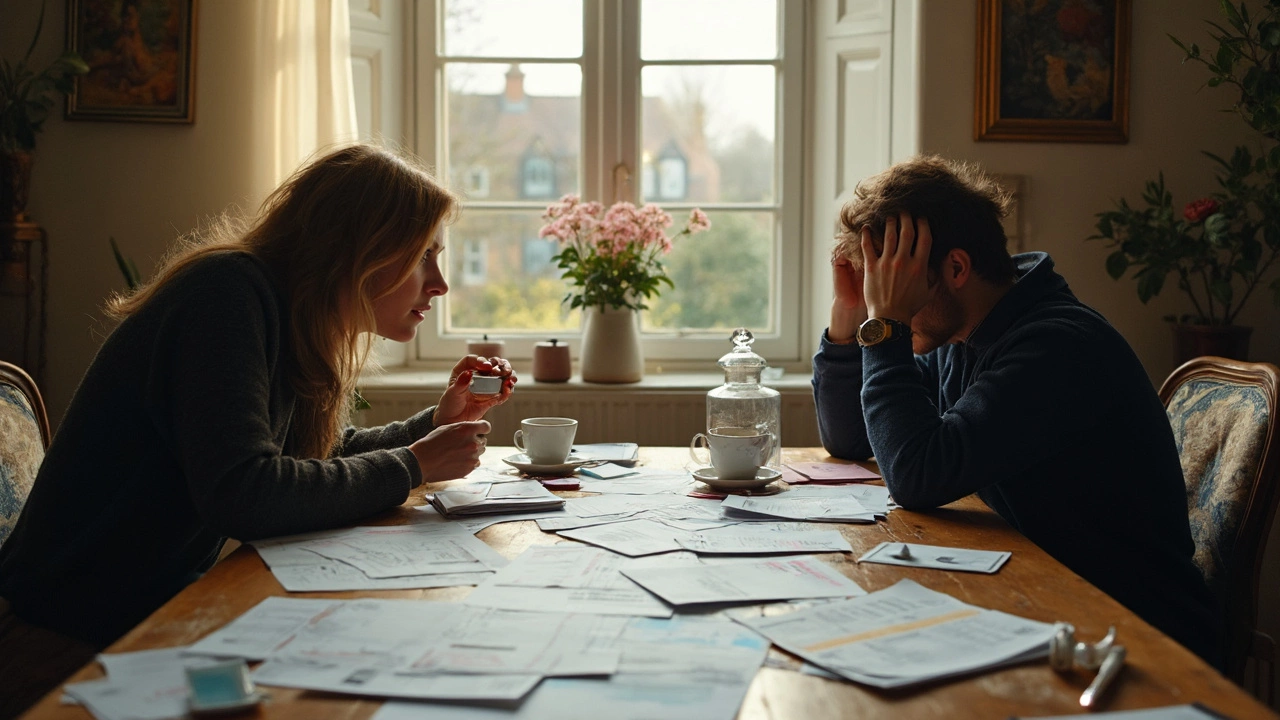
Timeline Surprises and Delays
With buying a house, you'd think the schedule is predictable. You see something you love, make an offer, and hope to get the keys in about 30-45 days. But that only happens if every step—from inspection to appraisal to paperwork—lines up perfectly. One survey from the National Association of Realtors reports that nearly one-third of all home sales are delayed, often thanks to issues like loan approval or last-minute repairs.
If you’re building a house, buckle up. The timeline for a new build in the US right now is anywhere from 7 to 16 months, according to the U.S. Census Bureau. Delays are almost guaranteed, and some aren’t even your fault. Weather, supply chain problems, even local permit slowdowns can turn your 10-month plan into a year and a half or more.
| Process | Typical Time | Main Delay Factors |
|---|---|---|
| Buying | 30-60 days | Loan approval, inspection fixes, title issues |
| Building | 7-16 months | Weather, materials, permits, contractor schedules |
It also pays to watch for hidden steps that take longer than you’d think. For example, getting city permits or HOA approvals can randomly eat up weeks. If you’re building in a growing area, you might even get stuck waiting for new utility lines or roadwork to wrap up. That’s lost time you usually don’t plan for.
If you want to get ahead of these delays, ask your builder for a real timeline—one that includes the not-so-obvious waiting periods. And if you’re buying, line up your financing early and double-check that your real estate agent is on top of every deadline.
Dealing with Stress and Headaches
No matter if you’re buying a house or building a house, get ready for at least a few headaches. Let’s be real—for most people, this is the biggest purchase of their life, so a little stress is standard. But there are clear differences in what kind of stress you’ll face depending on the path you pick.
If you decide to buy, you’ll probably enter a rollercoaster of bidding wars, home inspections, paperwork, and surprise issues. About 35% of buyers in 2024 said the process felt more stressful than they expected. Sometimes you get outbid several times before you finally land your own place. Even then, home inspections might uncover sketchy wiring or old plumbing, forcing you to go back to the seller or, even worse, eat repair costs yourself.
Building sounds like you’ll call all the shots, but in reality, you’ll end up making hundreds of decisions that can quickly feel overwhelming. Think floor plans, outlets, cabinets, roof shingles, paint colors, and endless meetings with contractors. One survey found about half of people building new homes said the number of sudden choices—even down to which light switches to use—felt way more draining than expected. Add to this the stress of construction delays, supply chain issues (which are still very real), and dealing with city permits.
Here’s a quick snapshot of common stressors for each:
| Buying a house | Building a house | |
|---|---|---|
| Bidding wars | Very common | Not an issue |
| Surprise repairs | Possible after move-in | Rare, since new |
| Decision fatigue | Low | High (endless choices) |
| Delays | Papers, appraisals | Construction, permits |
| Move-in timeline | Usually predictable | Can stretch unexpectedly |
So, what can you do? For buying a house, line up a good real estate agent and ask every possible question during the inspection. Don’t fall in love with the first house you see—have backup options, or you’ll be crushed if someone else grabs it. For building a house, get everything in writing with your contractor, check in often, and clarify timelines upfront. Don’t be afraid to say "no" if you feel pressured into upgrades you don’t really want.
No path is stress-free, but you can dodge a lot of landmines by staying organized and keeping your expectations in check from day one.
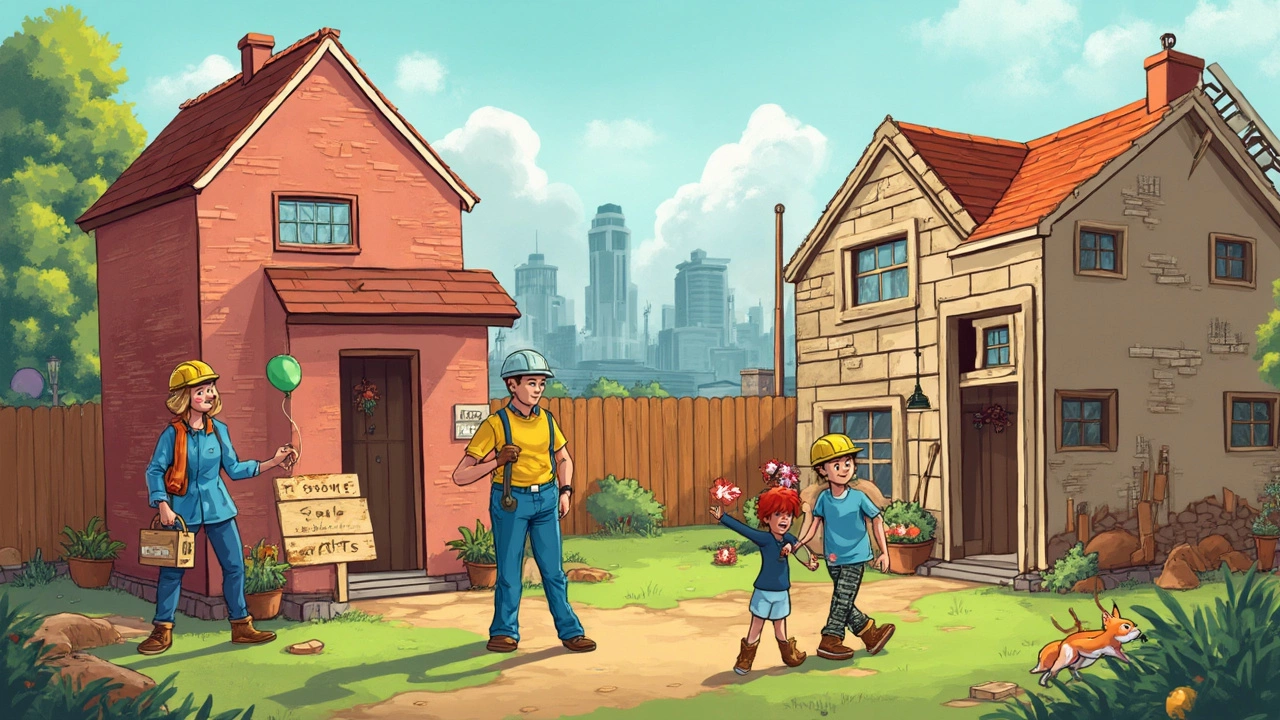
Real-Life Tips for Making the Call
So, do you go with buying a house or building from the ground up? The answer really comes down to what matters most in your day-to-day life, your wallet, and just how much chaos you can handle.
If you’re on a tighter budget, you’ll probably lean toward buying. On average, the National Association of Home Builders found that the median cost of building a house in the U.S. was about $500,000 in 2024, while buying an existing house hovered closer to $420,000. That’s a pretty real gap. But, keep in mind, the fixer-upper life can come with big repair bills the moment you get the keys. Always set aside at least 10-15% of your total price for surprise costs—moving, new appliances, or surprise leaks.
On the new builds side, you get to call the shots on layouts and finishes. No knocking out weird walls or living with 80s carpet. But here’s the straight truth: timelines almost always run over. It’s not weird to see build projects finish two to three months later than planned. Weather, zoning permits, or just plain old supply chain issues are common blockers.
Here’s a cheat sheet to help you make an honest call:
- Got time? If you need to move in fast, buying a house is usually faster—even in a rollercoaster market.
- Control freak? Want a perfect kitchen and energy-efficient touches? Go building a house. You can pick everything, from the tiles to how many sockets are next to your bed.
- Location matters? Most new builds pop up in the suburbs or edge of a city. If you’re set on a certain school district or commute, the options might not line up.
- Sweat equity? Handy with a hammer? Buying and renovating could save cash, but only if you know your limits. Surprises get expensive fast.
- Loan facts: Construction loans are way stricter and have higher rates than traditional mortgages. Make sure your credit and paperwork are seriously in order.
Curious about where costs add up? Check out this quick-hit table for a typical 2,000-square-foot home:
| Option | Estimate Price (2024) | Avg. Completion Time |
|---|---|---|
| Buying | $420,000 | 2 - 3 months |
| Building | $500,000 | 8 - 12 months |
At the end of the day, nail down your real budget, how much hassle you’re willing to put up with, and the timeline you want to stick to. Buying a house and new builds both come with hidden landmines. If you go in with open eyes and a backup plan (or three), you’ll land on the option that feels right for you.

